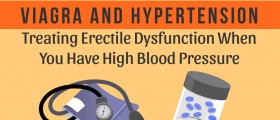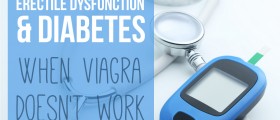
Erectile dysfunction, or male impotence, occurs when men suffer from inability to develop and maintain an erection of the penis. As a result, men will become unable to maintain normal sexual intercourse, which may be very frustrating and may cause a lot of distress. There are many different causes of erectile dysfunction. It affects men of all ages and it generally comes along with some other medical problems. People suffering from high blood pressure are at the highest risk of developing erectile dysfunction. The link between two conditions is associated with specific features of penile erection as a physiological phenomenon.
Penile erection
Penile erection is best described as a hydraulic effect that takes place when blood enters the penile area. As a result, penis becomes enlarged and firm, which makes the sexual intercourse possible. Penile erection generally results from complex interaction of psychological, neural, vascular and endocrine factors. It is associated with sexual arousal, but it also occurs spontaneously, and may sometimes fail even if the arousal of sexual desire is present. Penile erection happens when the venous blood enters tubular structures that run the length of the penis. These structures, known as corpora cavernosa, are made of small arteries, veins and muscles that relax before the erection, to allow a rush of blood into the penis.
Erectile dysfunction with high blood pressure
High blood pressure, also known as hypertension, is characterized by elevated levels of systemic arterial blood pressure. If a patient suffers from high blood pressure for long period s of time, he or she is at the highest risk of many severe health conditions. Problems with erection are commonly found in male patients. It is estimated that around 50% of men aged 40 to 79, diagnosed with high blood pressure, also have problems with erection. Sometimes, the erection problems occur as a result of vascular problems associated with high blood pressure. Hypertension affects the health of arteries and keeps the arteries that carry the blood to the penis from dilating. As a result, smooth muscles in penis lose their ability to relax and erectile dysfunction occurs since there is not enough blood to flow to the penis.
Drugs used in treatment of high blood pressure may also affect erection negatively. For example, beta-blockers can affect nerve impulses and therefore obstruct erection. Diuretics, often used to elevate the rate of urination, can decrease total blood volume and limit the blood flow to the penis.




_f_280x120.jpg)






_f_280x120.jpg)




Your thoughts on this
Loading...